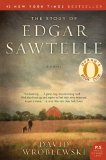Summary | Excerpt | Reading Guide | Reviews | Beyond the Book | Readalikes | Genres & Themes | Author Bio

A Novel
by David Wroblewski
Late in 1957 his mother got pregnant for a third time. She waited
until she was sure, and then a little longer, in order to break the news on
Christmas Day. The baby, she guessed, was due in July.
With the doctor’s admonition in mind, they changed the kennel rou-
tine. His mother still handled the younger pups herself, but when it
came to working the yearlings, willful and strong enough to pull her off
balance, his father came up to the mow. It wasn’t easy for any of them.
Suddenly Trudy was training the dogs through Gar, and he was a poor
substitute for a leash. She sat on a bale, shouting, “Now! Now!” in frus-
tration whenever he missed a correction, which was quite often. After
a while, the dogs cocked an ear toward Trudy even when Gar held the
lead. They learned to work the dogs three at a time, two standing beside
his mother while his father snapped the lead onto the third and took it
through the hurdles, the retrieves, the stays, the balance work. With
nothing else to do, his mother started simple bite-and-hold exercises to
teach the waiting dogs a soft mouth. Days like that, she left the mow
as tired as if she’d worked alone. His father stayed behind to do evening
chores. That winter was especially frigid and sometimes it took longer to
bundle up than to cross from the kennel to the back porch.
In the evenings they did dishes. She washed, he dried. Sometimes he
put the towel over his shoulder and wrapped his arms around her, press-
ing his hands against her belly and wondering if he would feel the baby.
“Here,” she’d say, holding out a steaming plate. “Quit stalling.” But
reflected in the frosty window over the sink he’d see her smile. One night
in February, Gar felt a belly-twitch beneath his palm. A halloo from an-
other world. That night they picked a boy name and a girl name, both
counting backward in their heads and thinking that they’d passed the
three-month mark but not daring to say it out loud.
In April, gray curtains of rain swept across the field. The snow rotted
and dissolved over the course of a single day and a steam of vegetable
odors filled the air. Everywhere, the plot-plot of water dripping off eaves.
There came a night when his father woke to find the blankets flung back
and the bed sodden where his mother had lain. By the lamplight he saw
a crimson stain across the sheets.
He found her in the bathroom huddled in the claw-footed tub. In her
arms she held a perfectly formed baby boy, his skin like blue wax. What-
ever had happened had happened quickly, with little pain, and though
she shook as if crying, she was silent. The only sound was the damp suck
of her skin against the white porcelain. Edgar’s father knelt beside the
tub and tried to put his arms around her, but she shivered and shook him
off and so he sat at arm’s length and waited for her crying to either cease
or start in earnest. Instead, she reached forward and turned the faucets
and held her fingers in the water until she thought it warm enough. She
washed the baby, sitting in the tub. The red stain in her nightgown be-
gan to color the water. She asked Gar to get a blanket from the nursery
and she swathed the still form and passed it over. When he turned to
leave she set her hand on his shoulder, and so he waited, watching when
he thought he should watch and looking away at other times, and what
he saw was her coming back together, particle by particle, until at last
she turned to him with a look that meant she had survived it.
But at what secret cost. Though her foster childhood had sensitized
her to familial loss, the need to keep her family whole was in her nature
from the start. To explain what happened later by any single event
would deny either predisposition or the power of the world to shape. In
her mind, where the baby had already lived and breathed (the hopes and
dreams, at least, that made up the baby to her) was a place that would not
vanish simply because the baby had died. She could neither let the place
be empty nor seal it over and turn away as if it had never been. And so it
remained, a tiny darkness, a black seed, a void into which a person might
forever plunge. That was the cost, and only Trudy knew it, and even she
didn’t know what it meant or would ultimately come to mean.
Excerpted from The Story of Edgar Sawtelle by David Wroblewski Copyright © 2008 by David Wroblewski. Excerpted by permission of Ecco, a division of Random House, Inc. All rights reserved. No part of this excerpt may be reproduced or reprinted without permission in writing from the publisher.
Your guide toexceptional books
BookBrowse seeks out and recommends the best in contemporary fiction and nonfiction—books that not only engage and entertain but also deepen our understanding of ourselves and the world around us.